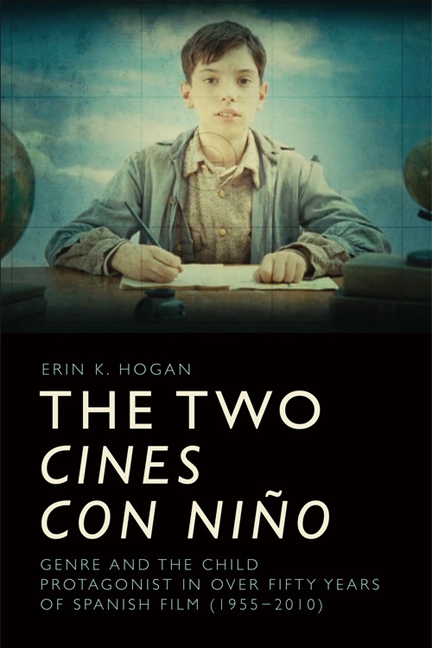Book contents
- Frontmatter
- Contents
- List of Figures
- Acknowledgements
- Figure Permissions
- Introduction The Two Cines Con Niño: The Ventriloquism, Dialogism and Biopolitics of the Children of Franco in Genre Film
- 1 The Black Market and the Stolen Children of Franco in Demonios En El Jardín
- 2 The Appropriative and Carnivalesque Ventriloquism of Altar Boys from Joselito in El pequeño ruiseñor to Ignacio in La mala Educación
- 3 Ventriloquism, Kidnapping and the Carnivalesque in Marisol’s Tómbola
- 4 Adopting, Adapting and Appropriating in the cines con niño: Un rayo de luz and El viaje de Carol
- 5 Prosopopeia and the Gothic Child from Marcelino pan y vino to El Orfanato
- 6 Dialogism and Ritual Function of the Nuevo Cine Con Niño: El Espíritu De La Colmena, Secretos Del Corazón And El Laberinto Del Fauno
- 7 Queering Post-war Childhood in Urte Ilunak and Pa Negre
- 8 The Transatlantic Dialogism in Narrative and Aesthetics of Bildungsfilms: La Lengua De Las Mariposas, Machuca, El Espíritu De La Colmena, El Premio, El Laberinto Del Fauno And Infancia Clandestina
- Conclusion Spanish Movies: Genre, Nation and Spanish Movie
- Select Filmography
- Select Bibliography
- Index
1 - The Black Market and the Stolen Children of Franco in Demonios En El Jardín
Published online by Cambridge University Press: 01 May 2021
- Frontmatter
- Contents
- List of Figures
- Acknowledgements
- Figure Permissions
- Introduction The Two Cines Con Niño: The Ventriloquism, Dialogism and Biopolitics of the Children of Franco in Genre Film
- 1 The Black Market and the Stolen Children of Franco in Demonios En El Jardín
- 2 The Appropriative and Carnivalesque Ventriloquism of Altar Boys from Joselito in El pequeño ruiseñor to Ignacio in La mala Educación
- 3 Ventriloquism, Kidnapping and the Carnivalesque in Marisol’s Tómbola
- 4 Adopting, Adapting and Appropriating in the cines con niño: Un rayo de luz and El viaje de Carol
- 5 Prosopopeia and the Gothic Child from Marcelino pan y vino to El Orfanato
- 6 Dialogism and Ritual Function of the Nuevo Cine Con Niño: El Espíritu De La Colmena, Secretos Del Corazón And El Laberinto Del Fauno
- 7 Queering Post-war Childhood in Urte Ilunak and Pa Negre
- 8 The Transatlantic Dialogism in Narrative and Aesthetics of Bildungsfilms: La Lengua De Las Mariposas, Machuca, El Espíritu De La Colmena, El Premio, El Laberinto Del Fauno And Infancia Clandestina
- Conclusion Spanish Movies: Genre, Nation and Spanish Movie
- Select Filmography
- Select Bibliography
- Index
Summary
‘Cuando en el 2002 estrenamos Los niños perdidos del franquismo, la sociedad española se estremeció al ver que el robo de niños en el contexto de la dictadura argentina y que habíamos llorado cómodamente sentados en el sofá de nuestras casas también se había producido en España.’ (Armengou 2011: 123)
[When we premiered Franco's Forgotten Children in 2002, Spanish society shuddered when it saw that the stolen children of Argentina's dictatorship for whom it had cried from the comfort of its home sofas had also occurred in Spain.]
Introduction
Chapter One conducts a close reading of Demonios en el jardín (Demons in the Garden) (Gutiérrez Aragón 1982) and, to a lesser degree, incorporates the documentaries Los niños de Rusia (The Children of Russia) (Camino 2001) and Els nens perduts del franquisme (Franco's Forgotten Children) (Armengou, Belis and Vinyes 2002), in order to illuminate the historical context of the stolen children of Franco and set the stage for the broader biopolitics of Francoism. Demonios en el jardín depicts the two Spains through a family split between the victorious, his conservative grandmother, and the vanquished, his single mother. The black marketeer grandmother's quashed efforts to reunite the family offer an alternative to Francoism by rejecting its genre strategy of promoting unity.
Marsha Kinder's 1983 essay, ‘The Children of Franco in the New Spanish Cinema’, identifies a trend in films from 1973 to 1980 by directors – José Luis Borau (1929–2012), Víctor Erice (1940–), Carlos Saura (1932–), Jaime de Armiñán (1927–), Jaime Chávarri (1943–), and Manuel Gutiérrez Aragón (1940–) – who were children during Francisco Franco's regime (1939–75) and whose features depict sensitive, precocious, and even murderous children and stunted, childlike adults. Including Gutiérrez Aragón's La camada negra (Black Litter) (1977), Kinder draws a parallel between the filmmakers of the New Spanish Cinema and their cinematic progeny:
They were led to see themselves as emotionally and politically stunted children who were no longer young; who, because of the imposed role as ‘silent witness’ to a tragic war that had divided country, family and self, had never been innocent, and who, because of the oppressive domination of the previous generation, were obsessed with the past and might never be ready to take responsibility for changing the future. (1983: 57–8)
- Type
- Chapter
- Information
- The Two cines con niñoGenre and the Child Protagonist in Fifty Years of Spanish Film (1955–2010), pp. 22 - 38Publisher: Edinburgh University PressPrint publication year: 2018



